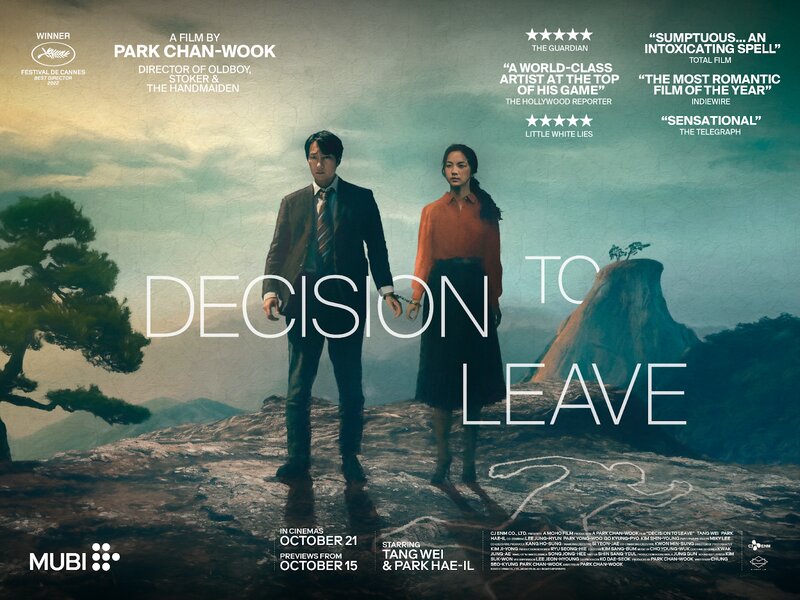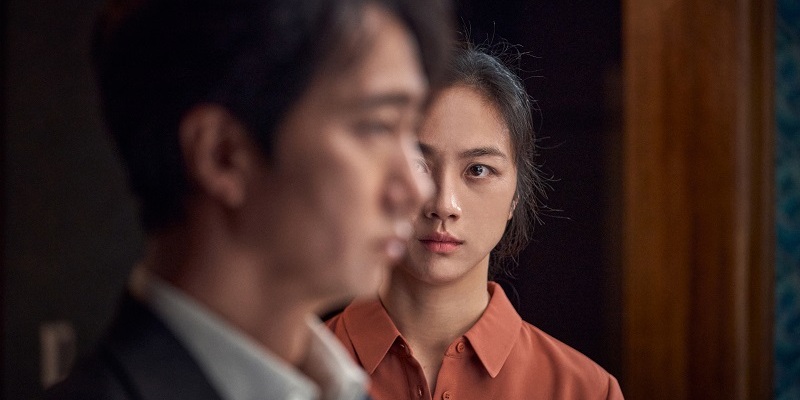
Review by
Eric Hillis
Directed by: Park Chan-Wook
Starring: Park Hae-il, Tang Wei, Lee Jung-hyun, Go Kyung-pyo, Park Yong-woo, Jung Yi-seo

Like his 2013 English language debut Stoker, Korean auteur Park Chan-Wook's latest, Decision to Leave, is a throwback to Hollywood's golden age of 1930s-50s
murder-mystery-melodramas. It might be described as an erotic thriller,
and it takes a few cues from Basic Instinct, but this could have played for 1940s audiences with practically no
interference from the Hays Code given its lack of any explicit
sexuality. There's less canoodling between its romantic leads than Cary
Grant and Ingrid Bergman engaged in for Hitchcock's
Notorious, yet it manages the difficult feat of being both erotic and
romantic.

Those romantic leads are Hae-jun (Park Hae-il), a detective
investigating the death of a mountaineer who either fell, jumped or was
pushed from a high cliff overlooking the Korean city of Busan, and
Seo-rae (Tang Wei), the dead man's pretty Chinese immigrant
widow. Hae-jun suspects foul play, his suspicions spurred by Seo-rae's
seeming indifference to her loss. He's also wildly attracted to the
young widow, and when the death is ruled a suicide, Hae-jun continues to
investigate, spying on Seo-rae like a Peeping Tom.
Hae-jun's surveillance is so obvious that Seo-rae twigs him early on,
but oddly enough, she seems flattered by the attention. The two begin
spending time together (Hae-jun is married but his wife lives in another
city) and fall in love. Hae-jun changes his mind regarding Seo-rae's
guilt, even allowing her to destroy crucial evidence. But has his heart
over-ruled his head? Is Seo-rae genuinely innocent or has she cleverly
manipulated Hae-jun? That's a question the viewer is forced to ponder
throughout Decision to Leave, and things get messier when further corpses start to appear.

There's a lot of Hitchcock's Vertigo in Chan-Wook's film.
Hae-jun is haunted by an incident in which he was powerless to stop
someone from falling from a height, for one thing. But unlike other
clones of Hitchcock's classic, Decision to Leave borrows
its compelling character dynamic. Like James Stewart's Scotty Ferguson,
Hae-il's Hae-jun is a rare depiction of a cop as an everyman. With his
sad-eyed expression, he's an unconventional leading man, certainly for a
romance, but Hae-jun is a good man and we see why Seo-rae, who has a
history of relationships with assholes, might be attracted to him. The
casting of the glamorous Wei means Seo-rae is a typically sexy femme
fatale, but her appeal goes far beyond her beauty. Even if she looked
like the back of a bus, Seo-rae would draw in a man like Hae-jun, a man
old enough to know some things are far more attractive than superficial
looks. In the film's most erotically charged scene, Seo-rae tucks
Hae-jun into bed and teaches the insomniac detective a method for
falling asleep. Not since
Phantom Thread
has the idea of a man being cared for by a woman been conveyed so
romantically. Hae-jun and Seo-rae couldn't be further from the likes of
Michael Douglas and Sharon Stone in Basic Instinct, but their relationship is far more tangible.
Modern technology has become something of a scourge for writers of
thrillers – think of how many times a movie has been forced to pull the
"damn, no coverage" trick – but Chan-Wook embraces the conveniences and
gadgets that rule our lives today. There's so much technology used here
that if you showed the film to someone living in 1980 they would
probably think it's a sci-fi movie and that Seo-rae will be revealed to
be an android at some point. A large part of why it's so difficult to
get away with crimes today is because our gadgets are constantly spying
on us and revealing our movements. There's a striking sequence involving
Hae-jun retracing the steps of a fitness app found on Seo-rae's phone,
and a major plot point sees a character hang onto a potentially
incriminating phone because it contains a recording of sentimental
value. It's interesting how much of Hae-jun's investigation echoes the
sort of actions employed by jealous lovers, with tracking apps secretly
loaded on phones and footsteps recreated to figure out where a suspect
might have travelled.

The central premise of a cop falling for a suspect is hardly novel,
yet Chan-Wook finds many ways to make it seem like it's the first time
we've seen this dynamic play out in a fresh and relatable fashion. In an
era where the workplace romance has become a taboo tantamount to
harassment, Chan-Wook taps into the illicit thrill of his film's central
courtship with his customary style. It's a forbidden romance, but one
even the most uptight of viewers will struggle not to endorse.


